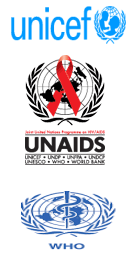Five priority actions being promoted to help all women adopt good infant feeding practices, while giving special support to HIV-positive mothers to make the best feeding choices for themselves and their babies.
NAIROBI—With the achievement of broad consensus on the appropriate ways to feed infants and young children in the context of HIV/AIDS, four UN agencies today urged governments to immediately scale up action in five priority areas to save lives and ensure the growth, health, development and well-being of all children.

UNICEF, WHO, UNFPA, UNAIDS and five other agencies are promoting a five-step framework to help reduce child mortality and HIV transmission, while enhancing support for breastfeeding among the general population and promoting achievement of other health-related goals. This approach, which has been widely endorsed among UN agencies and child feeding experts, is intended to help governments, in particular in high HIV-prevalence areas, to rapidly scale-up their infant and child feeding programmes and outreach.
"The HIV and Infant Feeding Framework will help enormously in creating and sustaining environments that encourage appropriate feeding practices for all infants and young children, while scaling-up interventions to reduce transmission of HIV," said UNICEF Executive Director Carol Bellamy. "The evidence tells us what we need to do to keep children as healthy as possible in the context of a world with HIV. We need to make sure we do it."
The five-step framework aims to significantly help reduce transmission of HIV through breastfeeding, while at the same time drawing attention to actions needed to reduce child mortality caused by poor infant feeding practices by HIV-negative mothers and mothers of unknown HIV-status. It calls for the adoption of a combination of measures that help to reduce the risk of HIV transmission to infants while minimizing the risk of morbidity and mortality caused by other infections.
"AIDS threatens child survival and welfare," said Dr. Peter Piot, UNAIDS Executive Director. "Good infant feeding practices must be widely promoted to help women, be they HIV-positive or negative, make informed choices to reduce child mortality."
The Framework outlines five priority areas for national action:
- Develop or revise (as appropriate) a comprehensive national infant and young child feeding policy, which includes HIV and infant feeding.
- Implement and enforce the International Code of Marketing of Breast-milk Substitutes and subsequent relevant World Health Assembly resolutions.
- Intensify efforts to protect, promote and support appropriate infant and young child feeding practices in general, while recognizing HIV as one of a number of exceptionally difficult circumstances.
- Provide adequate support to HIV-positive women to enable them to select the best feeding option for themselves and their babies, and to successfully carry out their infant feeding decisions.
- Support research on HIV and infant feeding, including operations research, learning, monitoring and evaluation at all levels, and disseminate findings.
The Framework has been developed in response to the need for more clarity on infant feeding in the context of HIV/AIDS. It's meant to provide guidance to national policy makers, programme managers, regional advisory bodies, public health authorities, UN staff, professional bodies, NGOs and other interested stakeholders, including the community.
UNFPA Executive Director Thoraya Ahmed Obaid said "the Framework strives to enable women who are HIV positive to make informed decisions on the best feeding options for their babies. It further challenges policy makers and stakeholders to make this a reality to ensure the means for women to exercise their decisions."
Dr. Joy Phumaphi, the WHO Assistant Director General for Family and Community Health, said "the Framework is meant to guide policy-makers and other stake-holders in planning and implementing activities. The aim is ultimately to help mothers to make the most appropriate infant feeding decisions in an HIV-related environment."
The Framework responds to the issues specific to countries hard-hit by HIV/AIDS. An estimated 3.2 million children under 15 years were living with HIV in 2002. A total of 800,000 were newly infected and 610,000 had died. The overwhelming source of HIV infection in young children is mother-to-child transmission. About 15-30% of the infections occur during pregnancy or delivery, and about 5-20% through breastfeeding. It is estimated that in countries with an HIV-prevalence above 35% in pregnant women, HIV/AIDS contributes up to 42% of under-five mortality.
For more information please contact:
- Victor Chinyama, UNICEF, +254 722 701 505 (Mobile); vchinyama@unicef.org; Website: www.unicef.org
- Fadela Chaib, WHO, +41 79 475 5556 (Mobile); chaibf@who.int; Website: www.who.int
- Anne Winter, UNAIDS, +41 79 213 4312 (Mobile); wintera@unaids.org, UNAIDS, Website: www.unaids.org
Contact Information:
William A. Ryan
Cell Phone: +66 89 897 6984
Email: ryanw@unfpa.org